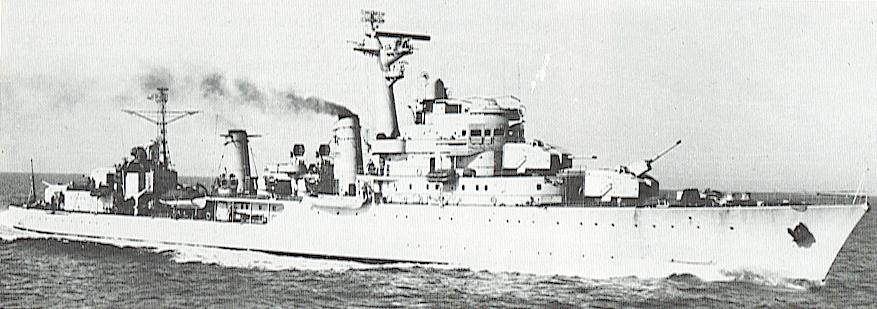

An interesting automatic weapon that grew out of the cancelled British 5" (12.7 cm) projects of the 1940s and 1950s.
The original plan was to use surplus 4"/45 (10.2 cm) Mark XVI guns in an automatic mounting similar to the mountings that Vickers was designing for the 5" (12.7 cm) post-war projects. Later, the gun was changed to a design similar to a high-powered anti-aircraft gun being used by the British Army. This mounting was to be used for rearming the Argentine training cruiser La Argentina and also for Peruvian and Chilean warships. None of these plans were proceeded with, but then in the mid-1950s Vickers and the Chilean navy struck a deal whereby a new 4" (10.2 cm) mounting would be used on two destroyers to be built by Vickers.
This gun loads though the trunnions with the breech forward of them, an unusual design feature that made it somewhat easier to load the gun at any angle of elevation. The Director of Naval Ordnance (DNO) was skeptical of this arrangement, as it was argued that this would make for a greater inertia in the rotating mass, hence for slower elevation and train. Vickers response was that this through-trunnion scheme had actually originated with the 2-pdr Mark M mounting, widely used during the war and considered a fairly successful weapon.
Constructed of an autofretted loose barrel, jacket breech ring and vertical sliding breech mechanism. The rammer was pneumatic with alternate left and right loading trays fed from left and right hoppers.
| Designation | 4"/62 (10.2 cm) Vickers |
|---|---|
| Ship Class Used On | Almirante Riveros (DD-18) |
| Date Of Design | 1957 |
| Date In Service | 1960 |
| Gun Weight | Gun with BM: 3.116 tons (3.166 mt)
Loose barrel: 1.066 tons (1.083 mt) |
| Gun Length oa | 258.0 in (6.553 m) |
| Bore Length | 248.0 in (6.300 m) |
| Rifling Length | N/A |
| Grooves | N/A |
| Lands | N/A |
| Twist | N/A |
| Chamber Volume | N/A |
| Rate Of Fire | 50 rounds per minute maximum
40 rounds per minute practical |
| Type | Fixed |
|---|---|
| Weight of Complete Round | 68 lbs. (30.8 kg) |
| Projectile Types and Weights | HE: 35 lbs. (15.9 kg) 1 2 SAP: 35 lbs. (15.9 kg) |
| Bursting Charge | HE: 3.75 lbs. (1.7 kg)
SAP: N/A |
| Projectile Length | N/A
Complete Round: 44.4 in (112.77 cm) |
| Propellant Charge | 14.813 lbs. (6.7 kg) N/S 198-054 |
| Muzzle Velocity | 2,953 fps (900 mps) |
| Working Pressure | 17.5 tons/in2 (2,759 kg/cm2) |
| Approximate Barrel Life | N/A |
| Ammunition stowage per gun | N/A 3 |
- ^Projectile weight from "British Naval Guns 1880-1945 No 18" and "Vickers-Armstrongs 101.6 mm (4 inch) L/62 Single Naval Mounting Mark N(R)." "The Naval Institute Guide to World Naval Weapon Systems 1991/92" shows a weight of 32 lbs. (14.5 kg).
- ^HE was supplied with Proximity, Time and Direct Action (Contact) fuzes.
- ^The gun fed from two hoppers, each holding 23 rounds. The hoppers either fed alternatively or from either one. This allowed two different ammunition types to be used at a cost of reducing the ROF in half.
| Elevation | Distance |
|---|---|
| Maximum Surface Range | 21,300 yards (19,500 m) |
| Maximum AA Altitude | 39,000 feet (11,890 m) |
| Designation | Single Mounts: Almirante Riveros (4): Vickers Universal Mount |
|---|---|
| Weight | 47,040 lbs. (21,337 kg) |
| Elevation | -7 / +85 degrees |
| Elevation Rate | 15 degrees per second |
| Train | Mounting was able to train 400 degrees in one direction. Unlimited training available when used with slip rings. |
| Train Rate | 35 degrees per second |
| Gun recoil | N/A |
| Loading Angle | Any angle |
- This mounting was electrically powered with a gyro sight and joystick for local control. Control cabin was located on the right side of the mounting. Gun house normally had seven crewmembers.
- The guns fed from two 23-round hoppers located between the trunnions. New rounds could be fed into the hoppers while the guns fired.
"British Naval Guns 1880-1945 No 18" article by John Campbell in "Warship Volume X"
"The Naval Institute Guide to World Naval Weapon Systems 1991/92" by Norman Friedman
"Vanguard to Trident: British Naval Policy since World War Two" by Eric J. Grove
---
"Vickers-Armstrongs 101.6 mm (4 inch) L/62 Single Naval Mounting Mark N(R)"
---
Special help from "whocaresaboutID"
05 April 2008 - Benchmark
14 August 2010 - Corrected projectile weight and added note regarding same
18 May 2024 - Converted to HTML 5 format, added data
